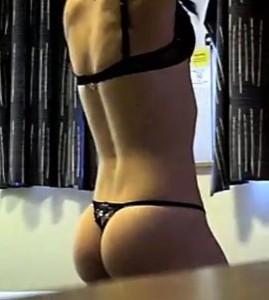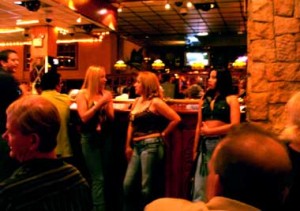Costa Rica News – Continued from Part 3 – On the immigration forms American Airlines passes out on its flights from Miami to San José, in fine blue print just below the usual blocks for your name and passport number and address, there’s a curious line in both Spanish and English: “The penalty for sexual abuse towards minors in Costa Rica implies prison. Law #7899.”
 When you get off the plane, there are posters taped to each of the kiosks where the immigration officers stamp your passport. They show the large, sad face of a teenage girl and, smaller and down in one corner, a pair of white man’s hands poking out through what appear to be the bars of a prison cell. “Her soul torn to pieces,” the text reads, “and you…behind bars.” Farther on, next to the door out of customs, there is a life-size cardboard stand-up of a tico—a cabbie, presumably—holding a sign. “Dear tourist,” the sign held by the sign says. “In Costa Rica, sex with children under 18 is a serious crime. Should you engage in it, we will drive you to jail. We mean it.” Finally, in the cabs that line up outside the terminal, there are versions of the same sign, again with “We mean it” underlined with a red slash.
When you get off the plane, there are posters taped to each of the kiosks where the immigration officers stamp your passport. They show the large, sad face of a teenage girl and, smaller and down in one corner, a pair of white man’s hands poking out through what appear to be the bars of a prison cell. “Her soul torn to pieces,” the text reads, “and you…behind bars.” Farther on, next to the door out of customs, there is a life-size cardboard stand-up of a tico—a cabbie, presumably—holding a sign. “Dear tourist,” the sign held by the sign says. “In Costa Rica, sex with children under 18 is a serious crime. Should you engage in it, we will drive you to jail. We mean it.” Finally, in the cabs that line up outside the terminal, there are versions of the same sign, again with “We mean it” underlined with a red slash.
Welcome to Costa Rica, where it is illegal to rape children. Where it is necessary, in fact, to remind every single tourist entering the country that it is wrong to rape children.
The reason those signs are posted, of course, is that Costa Rica has a reputation as a place where you can rape the kids, though it’s rarely put that bluntly. Pedophilia? Okay, yes, agreed: It’s very, very bad, and Costa Rica, like most developing nations, has suffered its share of foreigners preying on its kids. But read the signs again: “under 18” is in bold for a reason, one that is more demurely referred to as having sex with underage prostitutes, the estimated 5,000 to 10,000 teenagers in San José alone who’ve yet to reach the legal age of consent. Considering that the UNICEF study of young prostitutes found they turned their first trick at the average age of 14, it’s a huge problem.
In 2002, for example, the FBI, along with the Fort Lauderdale Police Department and the U.S. embassy in San José, set up a bogus travel agency called, unsubtly, Costa Rican Taboo Vacations, which promised, in magazine and Internet ads, to supply tourists with “companions” between the ages of 14 and 27. The feds say they were swamped with requests for information, and between December 2003 and August 2004 they arrested eleven people who’d paid deposits or booked trips—with what they believed was a legitimate commercial company—to have sex with kids. Among them: a South Carolina real estate agent and his wife who wanted a pair of 16-year-olds; a Hollywood, Florida, cop who also wanted two 16-year-olds; and a New Jersey middle-school teacher who paid $1,610 for a package that was to include two 12-year-olds.
That’s one example, the results from one fake company. Now eliminate the middleman, the cash deposits, the hard evidence. Just fly to Costa Rica, get drunk, meet a girl on the street. She’ll say she’s 18. Is she lying? She’s got an ID. Is it fake? How can anyone possibly tell? And will the local cops bust the guy who guesses wrong? Do they, in fact, mean it?
Paul Chaves is the man in charge of the Sexual Exploitation Unit in the Ministry of Public Security. He remembers, with  something between bitterness and bemusement, when Costa Rica got slammed in the mid- 1990s by the foreign media shooting video of underage prostitutes in downtown San José. ABC, NBC, the BBC, even Spanish television. The government ministers would deny on camera that there was a problem, then the reporters would roll the tape, add some line about “trouble in paradise”—devastatingly effective television. “I know how the media works,” Chaves says, and several times, because he has two brothers in journalism, which he also says several times.
something between bitterness and bemusement, when Costa Rica got slammed in the mid- 1990s by the foreign media shooting video of underage prostitutes in downtown San José. ABC, NBC, the BBC, even Spanish television. The government ministers would deny on camera that there was a problem, then the reporters would roll the tape, add some line about “trouble in paradise”—devastatingly effective television. “I know how the media works,” Chaves says, and several times, because he has two brothers in journalism, which he also says several times.
He also knows that those foreign reporters were right and that his government was wrong—tactically and morally—to say otherwise. So now he’s saying the opposite. Confessing it, really, so aggressively and often that he seems almost to be doing penance for the whole country. He’s a small, blustery man of 36, quite proud of his accomplishments since he took over the Sexual Exploitation Unit two and a half years ago. (His 120-man department also covers juvenile gangs, auto theft, and, oddly, copyright infringement.) When he started, only six of his men worked the sex beat, he says, sharing one car and never leaving San José. Now he has more than forty officers on the job, covering the entire country. Why, just that day his officers rousted a woman who was pimping girls out of a beauty salon. “Pimps and pedophiles,” he says. “Those are my two enemies.”
But not prostitutes. He is sympathetic: “Some girls who are doing this are students selling their bodies part-time.” He is philosophical: “I don’t think it would be worth going after prostitutes. Nonsense. Anyone can sell her body to someone else.” He is practical: “To try to police what women do with their bodies, or what men do with their bodies, we would be a police state.”
Valid points, all. He would acquit himself well in the academic debate. But what about the real-world debate? What about those 16- and 17-year-old prostitutes, the ones the TV crews caught on video and the ones who are still in the park by the Holiday Inn? Don’t they come with the territory? Isn’t that why those signs are cluttering up the airport, making all the legitimate tourists skittish?
“Sometimes,” he says, “I have my doubts.” Thoughtful pause. “Any man can make a mistake.”
So, no, all those airport signs—apparently, they don’t mean it.
Chaves hails a cab. It’s a long ride to his home on the outskirts of San José. He talks the whole way. About his 120 officers. About how helpful the United States and Britain have been. About his hatred of pimps and pedophiles. About his government finally admitting it has a problem with both.
The cab stops at his house. The chief of the Sexual Exploitation Unit tells the driver, who doesn’t speak English, to go on to the Holiday Inn, then says good night. He gets out and closes the door.
The cabbie flips on the dome light, reaches back with his right hand. There’s a small pink card between his fingers for a place called Scarlett’s Gentlemen’s Club.
“Titty bar?”
He knows enough English to get by.
BY SEAN FLYNN, GQ

